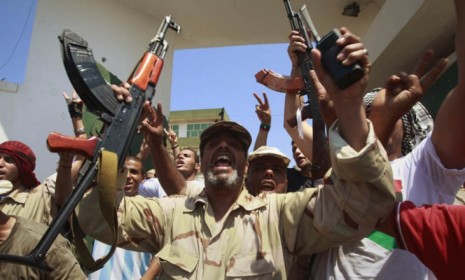Rebels sweep Tripoli: What's next for Libya?
The rebels trying to topple Moammar Gadhafi appear on the brink of succeeding — though many daunting questions about Libya's future remain

A free daily email with the biggest news stories of the day – and the best features from TheWeek.com
You are now subscribed
Your newsletter sign-up was successful
After almost half a year of slow, bloody, uneven battle to topple Libyan ruler Col. Moammar Gadhafi, rebel forces took control of most of the capital, Tripoli, with relative ease on Sunday. In a surprisingly well-coordinated assault from three sides, the rebels overran the headquarters of the dreaded Khamis Brigade, led by Gadhafi's son Khamis, then captured at least two of the despot's sons, including heir apparent, Saif. The exact whereabouts of Gadhafi, who has ruled Libya for more than four decades, are still unknown, though his defeat seems all but assured. What happens next in Libya? Here, four predictions:
1. The Transitional National Council will reunite the country
The rebel army is entering a Tripoli whose liberation was largely aided by residents of the city, and that's "the very best thing that could have happened," says Juan Cole at Informed Comment. Tripoli now joins "the Second Republic with its own uprising to its name, as a full equal of the Transitional National Council." That paves the way for a united interim government until elections can be held. Witness "the new Libya being born."
The Week
Escape your echo chamber. Get the facts behind the news, plus analysis from multiple perspectives.

Sign up for The Week's Free Newsletters
From our morning news briefing to a weekly Good News Newsletter, get the best of The Week delivered directly to your inbox.
From our morning news briefing to a weekly Good News Newsletter, get the best of The Week delivered directly to your inbox.
2. Or the rebels will split into warring factions
The biggest issue facing the Benghazi-based Transitional National Council is the lack of "one unifying figure who can lead Libya" after Gadhafi, says Michael Georgy at Reuters. The rebel coalition, after all, is made up of Arab nationalists, Islamists, businessmen, socialists, secularists, and various ethnicities and tribes, all of whom will now be vying for power. Post-Gadhafi Libya "is likely to remain a turbulent snake pit with heavily armed political factions for many years to come," says James Phillips at the Heritage Foundation. NATO forces must remain "vigilantly engaged" to keep the Islamists from "hijacking Libya's future."
3. With help and hard work, Libya will become stable
Luckily, the "TNC have been thinking about post-conflict stabilization for months, with more detail and care than U.S. planning for postwar Iraq," says Shashank Joshi in Britain's Telegraph. Far from being "a fractured rabble," the TNC is "actually one of the more cohesive and forward-thinking armed opposition movements to have emerged out of civil conflict in recent years." But there's still a daunting list of crucial tasks facing Libya's new leadership, says Daniel Serwer at CNN. They must ensure water, power, and other services; restart oil production; and prevent "internecine warfare." To succeed, they'll likely need help from Europe and the Arab League.
A free daily email with the biggest news stories of the day – and the best features from TheWeek.com
4. Gadhafi will be captured and tried — or killed
"Much now depends on the manner and timing of Gadhafi's going," says The Australian in an editorial. Sons Saif and Mohammed have already been caught and are slated for trial at the International Criminal Court in the Hague; the best outcome would be for their father to join them. Not so fast, says rebel spokesman Mahmoud Shammam. "We want to see him be tried in Libya and not in any other place in the world." Well, only if he's captured alive, says Richard Spencer in The Telegraph. Gadhafi has "pledged to die on Libyan soil," and that seems more and more likely. "I think it's impossible that he'll surrender," former Gadhafi right-hand man Abdel-Salam Jalloud tells Italy's RAI radio. But "he doesn't have the courage, like Hitler, to kill himself."